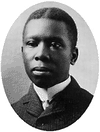Paradox
a situation or action or feeling that appears to be contradictory but on inspection turns out to be true or at least to make sense. The following lines from one of John Donne’s Holy Sonnets include paradoxes:
Take me to you, imprison me, for I
Except you enthrall me, never shall be free,
Nor ever chaste, except you ravish me.
The Paradox
Paul Laurence Dunbar
I am the mother of sorrows,
I am the ender of grief;
I am the bud and the blossom,
I am the late-falling leaf.
I am thy priest and thy poet,
I am thy serf and thy king;
I cure the tears of the heartsick,
When I come near they shall sing.
White are my hands as the snowdrop;
Swart are my fingers as clay;
Dark is my frown as the midnight,
Fair is my brow as the day.
Battle and war are my minions,
Doing my will as divine;
I am the calmer of passions,
Peace is a nursling of mine.
Speak to me gently or curse me,
Seek me or fly from my sight;
I am thy fool in the morning,
Thou art my slave in the night.
Down to the grave will I take thee,
Out from the noise of the strife;
Then shalt thou see me and know me—
Death, then, no longer, but life.
Then shalt thou sing at my coming.
Kiss me with passionate breath,
Clasp me and smile to have thought me
Aught save the foeman of Death.
Come to me, brother, when weary,
Come when thy lonely heart swells;
I ‘ll guide thy footsteps and lead thee
Down where the Dream Woman dwells.
Paul Laurence Dunbar wrote his poem “The Paradox” in paradoxes. Every stanza in the poem includes a paradox, which emphasizes the title of the poem. “I am the mother of sorrows, I am the ender of grief.” A mother symbolizes comfort and love, while sorrows are the complete opposite of comfort. A person never stops grieving, which makes the second line a paradox, “I am the ender of grief”. By writing the poem in paradoxes, Dunbar was able to create a poem that makes readers think about things more deeply because the paradoxes used in this poem have a certain truth to them.
"But a prayer that he sends from his heart's deep core." ~Paul Laurence Dunbar
Paul Laurence Dunbar

Paul Laurence Dunbar was born in Dayton Ohio on June 27, 1872. His father, Joseph and Mother Mitilda Murphy Dunbar were emancipated slaves. He graduated from Central High school with honors. He also served as editor of the school newspaper and was the class poet. Unable to attend college, he obtained a job as an elevator operator and wrote poetry in his free time.
He published his first book of poetry, Oak and Ivy, at his own expense in 1893. His second book, Majors and Minors, was published two years later. Due to the success of Majors and Minors he was able to publish a third volume of Poetry in 1896, Lyrics of Lowly Life, which was printed by a major publishing company. This was his most popular volume. This book contained poems written in the dialect of Southern Blacks.
The success of this volume enabled Mr. Dunbar the opportunity to travel to England. Upon his return to the United States he was hired as an assistant in the Library of Congress. In 1898, he married Alice Moore, but they separated in 1901.
Dunbar contracted tuberculosis when he was almost thirty. He tried various cures, alcohol being one of them, and he became addicted. Sick and discouraged over the lack of success of Heart of Happy Hollow (1904), he returned to Dayton where he died on February 9, 1906
(http://www.castproductions.com/dunbarbio.html)
